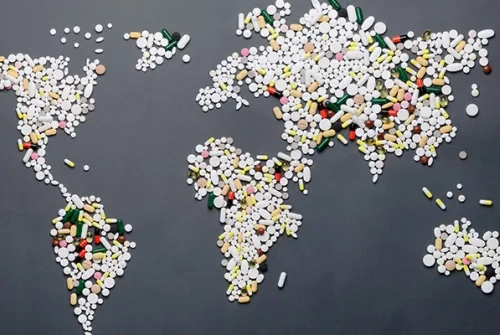What is Antibiotic Resistance?
Joint International Strategies Are Needed Against Antibiotic Resistance!
Today's resistance to antibiotics, which were considered miracle drugs that extended the average human life by 30 years when they were first discovered, continues to threaten the world as an important public health problem. Medical Microbiology Specialist Prof. Dr. Aynur Eren TOPKAYA said that antibiotic resistance is such an important and multidimensional issue that it cannot be prevented only by the efforts of healthcare professionals. Dr. Aynur Eren Topkaya said that for this reason, a multidisciplinary approach is required for a solution.
The U.S. Centers for Disease Control and Prevention (CDC) identifies antimicrobial resistance as an urgent global public health threat that has claimed the lives of at least 1.27 million people worldwide and was associated with the loss of nearly 5 million lives in 2019. On this important issue, the Medical Microbiologist gave important information on the occasion of European Antibiotic Awareness Week.
Antibiotic Resistance Also Increases Treatment Costs
Yeditepe University Kozyatağı Hospital Medical Microbiology Specialist Prof. Dr. Aynur Eren TOPKAYA pointed out that due to the emergence of microorganisms that have developed resistance to many antibiotics today, antibiotic resistance not only causes significant economic losses in addition to the public health problem created by antibiotic resistance, She said that antibiotic resistance is also among the agenda items of economic summits. Pointing out that antibiotic resistance rates are increasing day by day and, accordingly, the frequency of deaths due to infectious diseases is increasing in the society and she continued like this “Resistant microorganisms cause life-threatening and cannot be easily treated infections, mostly in hospitals but sometimes in the society. "For patients whose treatment period is prolonged due to resistant microorganisms, the hospital stay and therefore the treatment costs increase,"
How to Prevent Antibiotic Resistance?
“Antibiotic resistance is such an important and multi-dimensional issue that it cannot be prevented only by the efforts of healthcare professionals. "Therefore, a multidisciplinary approach is required for a solution," our expert said and continued: "In order to draw attention to this serious public health problem, the week of 18-24 November, which includes the European Antibiotic Awareness Day on 18 November every year, is organized by the World Health Organization (WHO) as "World Antibiotic Awareness Day". It has been accepted as Awareness Week. The activities held throughout this week should aim to raise awareness about antibiotic resistance all over the world and to disseminate the measures and good practices taken in this regard in society and health institutions. However, it should not be forgotten that this issue is so important and multidimensional that it cannot be prevented only by the efforts of healthcare professionals. Solutions should be produced on a global scale with interdisciplinary cooperation involving all stakeholders. "Because of the easier transportation conditions and increasing travel opportunities in our age, the problem is a global problem and common strategies need to be developed between countries."
Standard Antibiotic Susceptibility Tests Should Be Used in Laboratories to Prevent Antibiotic Resistance!
Our expert says that rational use of antibiotics is the most important factor in preventing resistance: “Medical Microbiology Laboratories should perform standard antibiotic sensitivity tests. "In order to prevent unnecessary use of antibiotics, these tests should be studied and reported only for microorganisms that cause disease," she said.
Can every febrile disease be treated with antibiotics?
Reminding that every individual in society has important duties to prevent antibiotic resistance, Yeditepe University Hospitals Medical Microbiology Specialist, Prof. Dr. Aynur Eren TOPKAYA made the following warnings: “Antibiotics should be used in the appropriate dose and for the appropriate duration. No antibiotics that are not prescribed by physicians should be used. Another important point is to know that not every febrile illness is treated with antibiotics. Antibiotics have no effect, especially on respiratory tract infections caused by viruses such as flu or cold. At this point, the importance of preventive health services increases. Because today, many viral diseases have an effective vaccine and vaccination is important. In this way, unnecessary antibiotic use should be reduced”
About
Faculty and Year of Graduation:
İstanbul University, 1988
”
See Also
- COVID-19 New Variant
- What is Parvovirus B19 (Fifth Disease)? What are the Symptoms of Fifth Disease?
- The Way to Prevent the HIV Pandemic Can Be Made with Awareness
- Do Not Run Away From the Vaccine! The Coronavirus Itself Is More Dangerous Than The Side Effects of The Vaccine...
- What Should be Paid Attention to in Face-to-Face Education?
- Flu Is Widely Seen This Year
- Attention! Holiday Return Cases May Increase
- Why Do Mosquitoes Bite Some People More?
- What is Monkeypox Virus? What Are the Symptoms of the Monkeypox Virus?
- Symptoms and Treatment of Sepsis
- Is it Necessary to Disinfect Outdoors?
- Can the Coronavirus Be Transmitted Through What We Eat?
- Use of Gloves During the Pandemic
- Frequently Asked Questions About Coronavirus
- Catching Coronavirus
- Multiple Tests Are Available for COVID-19
Alo Yeditepe




